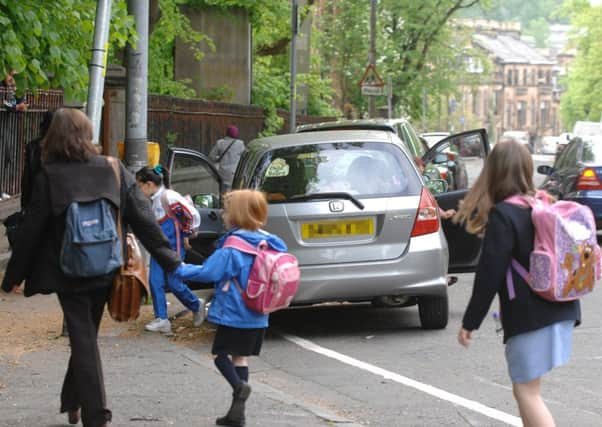Alastair Dalton: Cities must tackle scourge of school run


The notorious “school run” – if only it was indeed a jog – is guaranteed to raise temperatures among parents, whichever way they get their children to school. It’s an age-old problem, but one that Scotland is taking far too long to tackle.
Traffic jamming roads around schools and irresponsible – if not outright dangerous – parking has become the norm in many urban areas.
Advertisement
Hide AdAdvertisement
Hide AdWhen Glasgow Lord Provost Sadie Docherty referred to the scourge when welcoming delegates to a transport innovation conference in the city this summer, the reaction I got from the council came across like a resigned sigh.
When I asked about her remarks that parents parking around schools were “creating real difficulties” in the Linn area of the southside that she represents, because most pupils seemed to her to be dropped off by car, I was simply told it was a problem everywhere.
This is ironic considering a decade ago Glasgow was the first to criminalise parking on zig-zag “Keep Clear” lines which were painted outside school entrances for pupil safety.
That, alas, hasn’t deterred parents at one primary school in the city near me from routinely parking on the markings, right outside the playground gate, to drop off their children.
Depressingly, from the few to whom I have spoken to seek their views, such drivers are entirely unrepentant and if anything angry to be challenged about their behaviour.
I detected no hint of apology or regret. In fact, it was quite the opposite – I encountered the self-righteous attitude held by some motorists that they somehow have more rights than pedestrians, when they are not one themselves.
This flagrant and selfish disregard for fellow parents and children around schools suggests far more radical action is required, such as much steeper fines to underline the severity of the offence than the £60 that has thus far been imposed.
A better way of prosecuting miscreants is also needed, since Glasgow City Council tells me the number of drivers fined is “very low”. It said its enforcement activities were designed to deter instead, with many driving off immediately when they spot officials.
Advertisement
Hide AdAdvertisement
Hide AdMaybe pop-up bollards are needed – physically preventing parking at the most safety-critical spots during school hours but not reducing scarce space for residents at other times.
Glasgow is closely watching Edinburgh’s pilot traffic ban around nine primary schools, which councillors last week agreed to make permanent at two-thirds of the way into an 18-month trial.
The capital took its cue in turn from other forward-thinking local authorities, such as East Lothian, which launched its own experiment in Haddington two years ago.
Interestingly, the biggest impact in Edinburgh has been a 6 per cent overall reduction in the number of pupils being driven to school.
For children – and accompanying parents – walking or cycling instead has obvious health, congestion, safety and pollution benefits.
It may not be a viable option for some parents living more distant from schools and juggling domestic, work and other requirements.
But perhaps we have made it too easy to drive our children to school for far too long. With the number of vehicles on the road nearing a new record, along with lower fuel prices, it is a problem that could well just get worse.